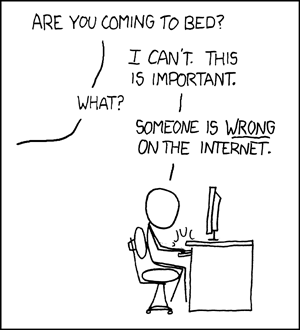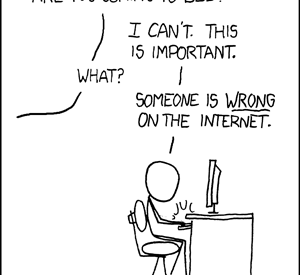For spurring people into action, misinformation seems to do a better job than no information at all.
Named after Ward Cunningham, the developer of the first wiki, Cunningham?s Law states that:
The best way to get the right answer on the Internet is not to ask a question, it?s to post the wrong answer.
?Unknown
Though at first sight this law seems pretty anecdotal or, at best, just about retweet-worthy, on a closer look it tells something interesting on one fundamental trait of human motivation.
When you see a question posted on an Internet forum, a WhatsApp group chat, or an email thread with several persons in it, you have no strong incentive to answer it. After all, plenty of other people saw the question too. Why should it be you who has to go through all the trouble of giving a helpful and informative answer? Anyone else might as well do it and spare you the trouble.
On the other hand, when the question has been answered with something that you know to be wrong, suddenly you become incentivized to correct this wrong. At that point the world has put you in a special place where you, you of all the people in the world, have the chance to correct the wrong answer, to improve the state of the humankind with your humble act.
In fact now there?s a competition on who is the fastest to correct the wrong! The message board is flooding with informative answers!
On a less uplifting note, there might be something rewarding in showing someone wrong and being the smartest person in the room.
This general human trait could be termed as the tendency to correct.
 From xkcd, under CC BY-NC 2.5.
From xkcd, under CC BY-NC 2.5.
This tendency is widely known and exploited: In French there is a saying prcher le faux pour savoir le vrai (preach the falsehood to know the truth), the FBI lists it as a human predisposition that an elicitor can take advantage of, and even Sherlock Holmes knew about it.
People don?t like telling you things. They love to contradict you.
?Sherlock Holmes
There are several possible applications of how to use this tendency to your benefit:
When asking a question, online or offline, reframe it so that it already contains a wrong answer or some misinformation:
?The planet nearest to sun is Mars, right??
?My new phone from X can?t shoot video, should I change to the latest model by Y?? In no time at all, you will have someone advising you how to shoot video with your phone.
Also, if you?re asking the question on an online message board, consider creating two accounts: one for asking the questions and the second one for giving the initial wrong answers to those questions. Trolling can also work surprisingly well, especially on more technically-oriented forums.
When you want to know what your friend (or a criminal suspect, for that matter) did last weekend, bake a false statement into the question:
?So you went clubbing last weekend??
?No, I was at my parent?s place!?
Here?s a trick using the same strategy for all parents:
?What did you do at school today, hon??
?Nothing.?
?Did you piggyback the principal across the hallways??
?No we had a math exam!?
When stuck in creative work, just throw something out there. Make a quick, even shitty first sketch of something and show it to your coworkers or clients and ask for feedback. Often this will storm them into action, get them to offer their own ideas, and to refine your initial sketch. Sooner then you know it, you will have improved on the first shitty sketch and got past the creative block. I know, it takes courage to show something that you know to be imperfect, but the faster you get through the block, the better the finished thing will turn out.
For spurring people into action, misinformation seems to do a better job than no information at all.
First published on Jussi Ahola?s Uncommon Sense


